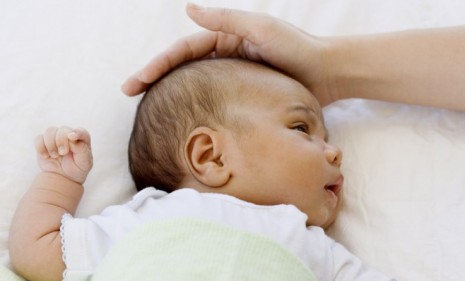Depressed moms: The surprising effect on their children's brains
A new study reveals that kids whose mothers suffer from postpartum depression have brains that resemble those of orphans

A free daily email with the biggest news stories of the day – and the best features from TheWeek.com
You are now subscribed
Your newsletter sign-up was successful
Postpartum depression is notoriously tough on moms — but it isn't just mothers who are affected. Surprising new research published in the Proceedings of the National Academy of Sciences reveals that the children of depressed moms develop differently from other kids. Brain scans show that the area known as the amygdala, which teaches children how to respond to the outside world, is larger in kids whose moms suffered from postpartum depression than in children whose mothers were not depressed. Here, a brief guide to this research:
How was this study conducted?
The researchers looked at 17 children whose mothers suffered from depression after childbirth, and 21 kids whose mothers were not depressed. All the children were 10 years old when their brains were scanned. Researchers also studied the mothers' depression since the kids were born. Because of the study's relatively small sample size, the findings should be treated with some caution.
The Week
Escape your echo chamber. Get the facts behind the news, plus analysis from multiple perspectives.

Sign up for The Week's Free Newsletters
From our morning news briefing to a weekly Good News Newsletter, get the best of The Week delivered directly to your inbox.
From our morning news briefing to a weekly Good News Newsletter, get the best of The Week delivered directly to your inbox.
How were the children of depressed moms different?
In every case, the children of depressed moms had an amygdala that was about 20 percent larger than the other children. That's important because the amygdala's job is to "scan the environment for threats and learn what to be afraid of, as well as to assign emotional significance to experiences and information," says Sharon Begley at The Daily Beast.
How could this affect the child?
It could be a survival mechanism. Because the amygdala is constantly on the lookout for danger, "having [an] enlarged amygdala could be protective and increase the probability of survival," says Dr. Sonia Lupien of the University of Montreal, as quoted in Medical News Today. The researchers also noticed that the children of depressed mothers had a stronger stress response to unfamiliar situations, as measured by the amount of stress hormones in their saliva.
A free daily email with the biggest news stories of the day – and the best features from TheWeek.com
What could be causing this difference?
Nobody's sure, but there's a clue to be found in the brains of children who were raised in orphanages. Studies have revealed that they also tend to have larger amygdalas, leading researchers to believe that the lack of maternal attention from depressed moms — who typically have "withdrawn, disengaged behaviors" — could be similar to the lack of attention that children receive in an orphanage.
Can this be prevented?
Possibly. Orphans who were adopted earlier in life did not have enlarged amygdala. That suggests that early intervention is effective. "No individual is alone in depression," says Dr. Lupien, as quoted in Medscape Medical News, "and it might be important to take care of the children as well as the mother and/or father in order to prevent the effects of depression from spilling over other family members."
Sources: Daily Beast, Medical News Today, Medscape Medical News, ScienceDaily
-
 Political cartoons for February 14
Political cartoons for February 14Cartoons Saturday's political cartoons include a Valentine's grift, Hillary on the hook, and more
-
 Tourangelle-style pork with prunes recipe
Tourangelle-style pork with prunes recipeThe Week Recommends This traditional, rustic dish is a French classic
-
 The Epstein files: glimpses of a deeply disturbing world
The Epstein files: glimpses of a deeply disturbing worldIn the Spotlight Trove of released documents paint a picture of depravity and privilege in which men hold the cards, and women are powerless or peripheral